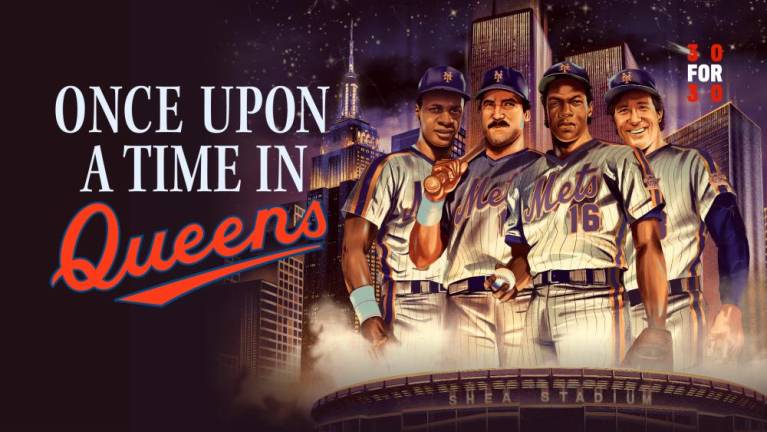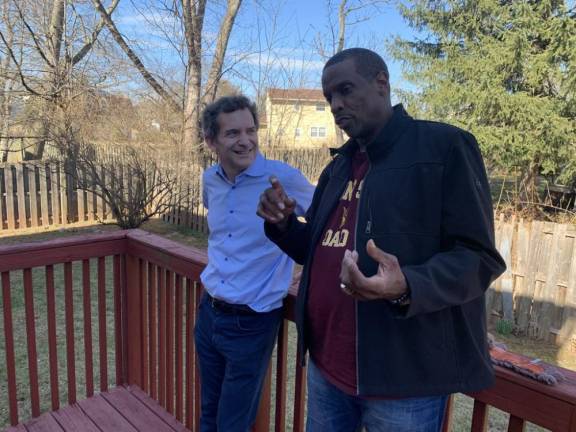Recreating the Magic of the ’86 Mets
Director Nick Davis captures the once-in-a-lifetime moments of the quintessential New York team in new docuseries


When asked to describe the atmosphere of Shea Stadium in the 1980s, Nick Davis simply said, “you can’t.” However, for as long as he can remember, he made it his professional mission to convey the emotions the Mets brought to New York at the time. “I was at a game at Shea in the summer of ’85. Dwight Gooden was pitching. And the place was electric. I remember saying to myself, “Remember this feeling. It’s not gonna happen again.””
As a lifelong Mets fan, his dream came true, because 35 years later, Davis got behind the camera to direct “Once Upon a Time in Queens,” chronicling the storied team, which was, as he describes, “charismatic as it was talented,” through old footage and interviews with former players like Lenny Dykstra, Mookie Wilson, Darryl Strawberry, Dwight Gooden and Keith Hernandez. They all surprised Davis by their incredible openness – speaking candidly about both the good and the bad that came with being the biggest stars in New York back then, which included, of course, a World Series win as well as an indulgent life of nightclubs and drug use.
Born and raised on the Upper West Side, Davis comes from a movie-making family which he calls “a complicated legacy.” In fact, his book, “Competing with Idiots” a biography of his grandfather Herman Mankiewicz, who cowrote “Citizen Kane” with Orson Welles and his great uncle Joseph Mankiewicz, who wrote and directed “All About Eve,” was coincidentally published on the same day as the docuseries premiered on ESPN.
How can you describe the atmosphere at Shea back then?
You can’t. Luckily, through the film we have a lot of great footage and we have people who were there at the time. The act of a historical documentary is to resurrect the past and that’s what I wanted this film to do, to resurrect the feeling of being in New York City in the mid ‘80s and in 1986 – it was so electric, it was so dynamic, it was so thrilling and dangerous and wild and unruly. And the other thing that happened was that team fused with the city in a way that I don’t think usually happens with sports teams. You think of great historical baseball teams and they don’t capture the flavor of their time and place the way the ’86 Mets did. I don’t know why it happened. I don’t know how it happened. But it did happen and we all felt it at the time. And the interviewees all sort of attest to it. The city had been in the toilet in the ‘70s; the Mets were in the toilet in the ‘70s. And somehow as the Mets got better in the ‘80s as Joe Petruccio says in the documentaries, the city got better. I don’t know that the Mets had anything to do with it, but it felt like it.
But Lenny Dykstra, Mookie Wilson, Darryl Strawberry, Dwight Gooden, Keith Hernandez and Gary Carter – that was New York in the mid ‘80s.
As for the interviews with the players, what surprised you about what they said?
A couple of things surprised me. As I said before, they were so smart about baseball, which, I, as a baseball fan, never really thought about. I just thought, “They’re really good. And they’re good hitters, good pitchers, and whatever.” But they were really smart about baseball and they loved talking baseball, not just with me now, 35 years later, but with each other. And the way they hung out with each other and talked baseball after games. They would let the Shea Stadium parking lot empty out after a Sunday day game and would just crack open some beers and talk baseball. Yes, they were wild and crazy and did all kinds of things off the field in nightclubs and got involved with cocaine and drinking, and all that’s in the film.
And the other thing that surprised me was how open they were and how willing they were to discuss their failings and their emotions and feelings and the challenges that they faced in their lives. Obviously, most famously, Dwight Gooden and Darryl Strawberry, and the problems they had with alcohol and cocaine and the abuse. But also, their childhoods. I didn’t know Dwight Gooden had the childhood that he had. We all thought, I think, at the time, that he came from a solid middle-class background. But he had been witness to a great deal of trauma, including the fact that his mother shot his father. And he lived and they remained married. That was news to me and Dwight’s willingness and openness. He’s such a sweet guy.
That was one of my questions, actually, were you taken aback at how open Dwight Gooden was, especially about his drug use.
Yeah, I was. And Darryl was open. And Keith was so open about the nuanced relationship that he had with his father, which was completely new to me. And I was very surprised by how open they were. I know Dwight feels like if he tells his story he can help some people. And certainly Darryl feels that way too. And I was so grateful, not just as a filmmaker gathering material, but just as a person, I just was really grateful that they shared those stories with us.
Did you get a sense that if they could go back and change certain things, they would have?
Yes, but I don’t think that any of them are really eaten away by regret. I think it’s the old, “Regrets, I’ve had a few, but then again too few to mention.” And the fact is, as much as I think a lot of them feel like, “We should have won more World Series,” they’re all pretty damn happy they got the one. And wouldn’t trade that 1986 World Championship for just about anything, I don’t think. I think that winning that year in this city meant so much to all of them and still means so much to all of them. And you can see that on the face of Lenny Dykstra towards the end of the film.
Were you surprised that Lenny Dykstra had no filter?
No, well, you know, he’s sort of a well-known wild man. But I think he’s crazy like a fox. He’s a terrifically entertaining and brilliant guy. And his interview was one of the most incredible experiences of my life because I was in New York City. I was Zooming with him, but we hired a local crew in Hollywood. One of our producers met him and made sure he got to the interview ... And actually he was the first COVID interview that we did, so I was really nervous about it. But it was fantastic and an incredible experience because he ran the gamut. He was incredibly hilarious and profane, but he was also very open and deeply moving.
And at the end of the interview, I felt like I was in the presence of Marlon Brando in “On the Waterfront.” His final speech in the film, to me, was the equivalent of, “I could’ve been a contender.” He was looking back, and he says, “You know, my life now, days turns into weeks, weeks turn into months, months turn into years. But it’s okay. Because you know why? Because I won a World Series in New York City. And where do you go from there?”
Once Upon a Times in Queens is available to watch on ESPN+ as part of its “30 for 30” collection